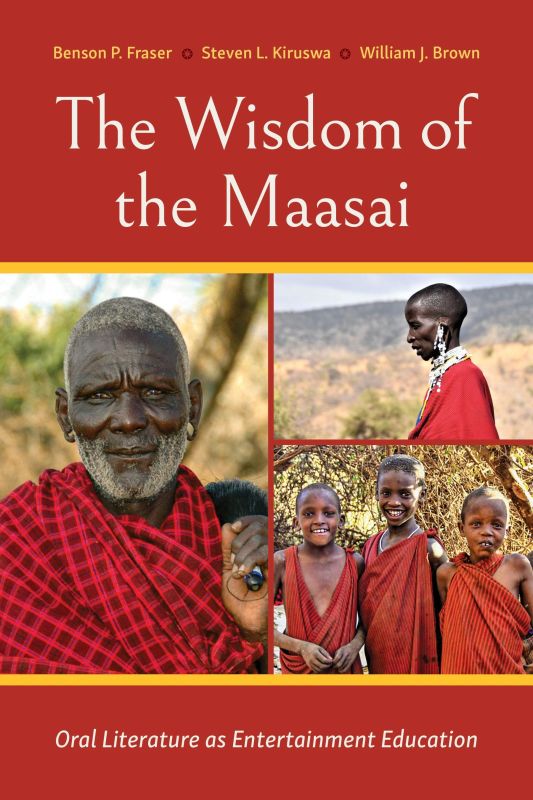Share this Story
The Wisdom of the Maasai
VWU's Dr. Benson Fraser co-authors book about African community’s storytelling, and the value of age-old tales in modern society
University News | October 23, 2024
This is a story about the value of a good story. It began decades ago when VWU Westminster Canterbury Fellow for Religious Studies and Lifelong Learning Dr. Benson P. Fraser hired one of his students, Steven Kiruswa from Tanzania, to do some work around his house. 
“He was working in the yard and as I looked out through my kitchen window, I saw my two boys and a number of their friends all gathered around Steven listening to him tell a story about how he had killed a lion with only a spear and sword,” explained Dr. Fraser. “I listened to the tail end of the story and was impressed with him and his people—the Maasai. I knew he was a warrior, but to kill a lion seemed frightening. I must add that Steven eventually worked for the African Wildlife Foundation and helped encouraged his people to give up the practice of hunting lions which was one of the rituals of becoming a Maasai warrior in his community.”
That one story ignited Dr. Fraser’s interest in the Maasai culture. Then in 1999, he, his brother, and another colleague, accepted an invitation from Steven to visit his village. Dr. Fraser says few experiences have been more important and life changing as those two weeks he spent in Kenya and Tanzania. “While these stories were strange to our western ears, they were also imaginative and dramatic,” he says. “Through these stories we learned about their culture and beliefs.”
Dr. Fraser has been back to Tanzania and Kenya many times since, producing a film on HIV/AIDS awareness, working to help develop community water resources, and building schools. Throughout these visits, he became especially interested in the important role storytelling plays in the Maasai community and how they not only entertain but also educate and provide moral guidance, touching on topics as wide ranging as politics, history, law, religion, sociology, art, language, health, and social welfare.
“These stories carry relatable truths because they come out of the lived experiences of the storyteller and the community, something that doesn’t always happen in mediated storytelling,” emphasizes Dr. Fraser. But as durable as these stories have been – recounted through many generations, even centuries – they are increasingly vulnerable to being lost due to societal changes brought on by modernization and the intrusion of the internet, mobile phones, and social media.
To help preserve some of these tales, Dr. Fraser partnered with Steven (who is now Deputy Minister for Minerals of the United Republic of Tanzania) and another colleague, Dr. William J. Brown, to write a book, “The Wisdom of the Maasai: Oral Literature as Entertainment Education,” which details the Maasai’s storytelling tradition, performance techniques, and symbolism, along with more than 70 distinct narratives about people, animals, monsters, warriors, morals, myths, and legends. Among them, “The Dorobo and the Giraffe” is about the selfishness of a person who refuses to share his bounty with a friend, which results in his losing everything. “The Lioness and the Ostrich Chicks” dramatizes that one need not be afraid of protecting the weak from the injustice of the strong, that the wise must not be afraid to speak up for the poor and needy, and to stand against every form of oppression.
“These stories are as relevant in a modern capitalist country like ours as they are in a traditional culture like the Maasai,” says Dr. Fraser. “It is true that here in the west we do not have the same challenges that face the Maasai, yet we do have hardships and challenges of various kinds. We may not face the severe physical tests they face as we have homes and communities that provide great comfort. Still, we live in a culture that often finds us anxious and depressed. Many of our young people are unhappy with their lives and need to be challenged to face and overcome their difficulties.
“We can find in the stories of the Maasai wisdom to nurture positive values in our lives despite the adversities or conditions confronting us. Whether we experience challenges at work, school or in our families, we need to seek a way to face the difficulties that confront us and find inner strength to live a fulfilled and productive life.”
Dr. Fraser says even the monster stories say something about every nation’s shared human nature. “Who has not known someone who so distorted their humanity that they acted like a monster and demeaned or belittled the lives of others? These Maasai stories are not sentimental tales that make us feel good. Truth rarely makes us feel good but often confronts us, frequently indirectly, as it does in several of the monster or animal stories, with a difficult truth. As my students here at VWU continue to remind me, life is often difficult and hard. Yet, if we persist in seeking our goals, we are often rewarded with a sense of accomplishment and wellbeing.”

